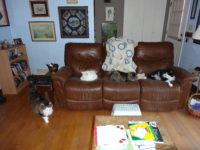 I was sitting in a booth at Applebee’s when it happened: love at first sight. While we waited for our food to arrive, our friend Dubbs happened to mention an all-staff e-mail that she and Matt had seen earlier that day. A woman whose young son had developed sudden and severe allergies was seeking a home for her two cats, Linus and Skittle. My interest was already piqued, but then Dubbs showed me the picture included with the message, and I was smitten. I’ve long had a particular affinity for tiger cats, and when our beloved tiger Bocca died in 2009, we soon ended up with another one, Jackson; however, in the two years since Jackson had died, I’d had a tiger-striped void in my heart — and here was a picture of not one but two of them, a father and a son.
I was sitting in a booth at Applebee’s when it happened: love at first sight. While we waited for our food to arrive, our friend Dubbs happened to mention an all-staff e-mail that she and Matt had seen earlier that day. A woman whose young son had developed sudden and severe allergies was seeking a home for her two cats, Linus and Skittle. My interest was already piqued, but then Dubbs showed me the picture included with the message, and I was smitten. I’ve long had a particular affinity for tiger cats, and when our beloved tiger Bocca died in 2009, we soon ended up with another one, Jackson; however, in the two years since Jackson had died, I’d had a tiger-striped void in my heart — and here was a picture of not one but two of them, a father and a son.
Matt apparently knew that once I saw the picture, we as good as had two more cats. Nonetheless, I was hesitant. We already had four cats, and though cats are relatively low-maintenance pets, each still comes with some degree of additional effort, expense, and shedding fur. The cats were temporarily living with the woman’s parents, but since her father also had allergies, albeit less severely than her son, the cats had been confined to the laundry room — not ideal, yet not urgent, either, so I e-mailed the woman to say that she could consider us as a backup plan, but that we wanted to wait a bit longer before committing.
Checking back a week or two later, I learned that the cats were still in the laundry room with no other offers of a forever home, so we went ahead and said we’d take them. Upon learning that our hesitation had come from the fact that we already had four cats, the woman said that six cats was just too many, and they’d keep trying to find a different solution, but I insisted that since we’d had six cats in the past, we knew we had room in both our home and our hearts.
In their picture, Linus and Skittle looked much alike, but in person (or “in cat”?), there were more obvious differences: Skittle was a more conventional short-haired tiger, whereas Linus was a long-hair with brownish-gray tiger coloring, but without the clearly delineated stripes. Skittle was cute, but Linus was the looker, almost like a small Maine Coon. Their temperaments differed as well, with Skittle rarely leaving the bedroom, his safe place, while Linus roamed all over the house and gladly greeted visitors.
Despite Linus’s more venturesome spirit, he stuck close to his son, especially in their first weeks with us. When we’d go into the bedroom, they’d often both be under the bed, but when they’d come out to see us, they’d walk back and forth next to each other, rubbing sides affectionately.
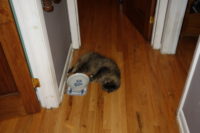 Even as they both got more accustomed to us, our house, and its other feline residents, Skit remained a skittish and bed-centric kitty. To try to keep him from getting dehydrated, we started putting a water bowl in the upstairs hallway, in addition to the one we had in the kitchen. Linus developed a predilection for curling up or sprawling right next to it, prompting Matt to take a picture of his sacked-out form and caption it, “If you don’t talk to your cat about drinking, who will?”
Even as they both got more accustomed to us, our house, and its other feline residents, Skit remained a skittish and bed-centric kitty. To try to keep him from getting dehydrated, we started putting a water bowl in the upstairs hallway, in addition to the one we had in the kitchen. Linus developed a predilection for curling up or sprawling right next to it, prompting Matt to take a picture of his sacked-out form and caption it, “If you don’t talk to your cat about drinking, who will?”
Linus’s other favorite spot was on the arm of the couch, usually on my side. When I’d sit down to read, eat, or watch TV, he’d often be quick to join me, which meant that my left hand had to be occupied in petting him, or he’d let me know that I was slacking in my duties. His typical way of letting me know was to try to reach out and prick me with world’s sharpest claws, but occasionally, he would go with world’s loudest meow instead. He didn’t use his voice often, but when he did, it was impossible to ignore. My father might have described it as a “stentorian squawk”; Walt Whitman might have described it as a “barbaric yawp.” It was startlingly low, as well as startlingly loud, and if Linus had resorted to it too frequently, it probably would have been rather annoying, but as a rare phenomenon, it cracked us up every time, because it was hard to believe that such a raucous noise could come from such a delicate creature.
Though not a lap snuggler, Linus would, after a few minutes of my petting him, either turn around and just sit on the arm of the couch or curl up against my feet as they rested on the recliner. More than once, I remained in an uncomfortable position for far too long, in an attempt not to disturb such a comfortable-looking cat.
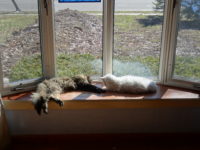 Linus had the ability to seem comfortable pretty much wherever he lay. Lounging in the sun streaming through the bay window, he’d give the impression of having melded and become one with the wooden window seat. Sometimes he’d put his head down in such a way that he appeared to be sleeping on his face, burying his nose into the surface on which he was lying, and we’d check his sides to make sure he was still breathing.
Linus had the ability to seem comfortable pretty much wherever he lay. Lounging in the sun streaming through the bay window, he’d give the impression of having melded and become one with the wooden window seat. Sometimes he’d put his head down in such a way that he appeared to be sleeping on his face, burying his nose into the surface on which he was lying, and we’d check his sides to make sure he was still breathing.
Just a week ago or so, I came upstairs and started to laugh at how Linus was lying stretched out in the doorway to my office; I remember thinking that if I hadn’t known about his melding tendencies, I might have thought he was sick, allowing himself to be in such a vulnerable position in a high-traffic area. While I was still standing there looking at him, Matt came up and let me know that when he’d set out food, Linus had showed no interest, and that wasn’t like him. Worried, Matt planned to make a vet appointment the next day.
We had actually taken Linus to the vet just three months earlier, because even though he’d eat, he was skinny when we got him and seemed to be getting skinnier still. I never ran my hand down his back, because feeling his bony spine was too disturbing; I’d just gently pet his sides or scritch his head. But even his head was starting to feel more skeletal than usual. However, the earlier vet visit hadn’t revealed anything obvious, so we knew he was skinny, yet convinced ourselves he wasn’t sick.
Last week, the illness became undeniable. When Matt brought Linus back from the vet, he warned me that the prognosis wasn’t good, but Linus had gotten some subcutaneous fluids, anti-nausea medication, and steroids. We hoped they’d make a difference, and initially, they did. The vet wouldn’t say anything firm about life expectancy, and when Linus appeared to rally, I thought maybe we’d at least have months, if not years, and even wondered if someone would have to give him his medicine when we went out of town for Thanksgiving. A foolish worry, in retrospect.
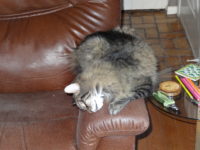
Friday night, a friend came over and brought Linus downstairs to hold in her lap. When he got up and tried to get off the couch, he didn’t land on his feet, but splashed down in an awkward heap. He’d again stopped eating, and his meows were uncharacteristically high and faint.
I didn’t sleep well Friday night, and woke early on Saturday. Linus was by his water bowl, but rather than lounging, he sat like an uncomfortable sphinx. Not wanting to disturb him or to risk his falling off furniture, I got out an exercise mat and unrolled it next to him, lying where I could face him and reach out to stroke his still-soft fur, his empty stomach gurgling multiple times, my tears making small pools on the mat’s gray plastic.
Linus’s eyes were leaking fluid too, and they’d somehow gotten smaller in the night — smaller and more triangular in shape, with disproportionately large pupils. This was the sign we’d prayed not to see, and yet it was almost a relief, as well, because now we knew what to do. We remembered this eye change happening to both Jackson three years earlier and Macska the year before that, and it seemed to be the confirmation that the time for medicine was past, and that we now had to give Linus the best gift left us to give: the chance to rest in peace.
When we’d first gotten the e-mail about Linus and Skittle, our hesitation to adopt them was mainly because, let’s face it, six cats is a lot of cats … but it was also in part because the e-mail mentioned their ages: twelve and ten. Yet Jackson had also been around twelve when we took him in, and he was with us for six more years. Linus, however, was only ours for a little over a year.
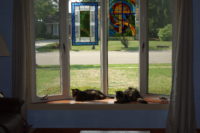 To be honest, I’m not sure exactly where I’d draw the cost-benefit-analysis lines: in Jackson’s case, six years was about three more years than I’d expected we’d have him, so I was grateful; if I adopted an older cat who died the next month, I’m guessing I’d feel that the costs outweighed the benefits. And in Linus’s case? Thirteen seems too young for a cat to die, especially if that cat was a doted-upon indoor-only pet. And barely over a year seems not nearly long enough to have a cat. So was our adopting him worth it? Absolutely.
To be honest, I’m not sure exactly where I’d draw the cost-benefit-analysis lines: in Jackson’s case, six years was about three more years than I’d expected we’d have him, so I was grateful; if I adopted an older cat who died the next month, I’m guessing I’d feel that the costs outweighed the benefits. And in Linus’s case? Thirteen seems too young for a cat to die, especially if that cat was a doted-upon indoor-only pet. And barely over a year seems not nearly long enough to have a cat. So was our adopting him worth it? Absolutely.
So sorry to hear about our loss. You made his last years ones of love and comfort.
Tricia
I got teary-eyed at your tender thoughts about Linus.